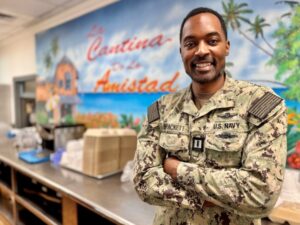
Story by Emily McCamy
U.S. Navy Medicine Readiness and Training Command Guantanamo Bay
GUANTANAMO BAY, Cuba – Quality healthcare, patient safety and mission readiness drive U.S. Naval Hospital Guantanamo Bay’s goals as the only medical treatment facility available at U.S. Naval Station Guantanamo Bay.
Among the many professionals dedicated to this mission, Lt. Donte Brackett, the hospital’s dietitian – and U.S. Navy Dietitian of the Year – plays a crucial role in shaping warfighter readiness and ensuring patient safety through education.
“Food science is fascinating, especially in how it varies based on factors like age and health conditions,” Brackett said. “I love educating and empowering people to make informed choices, and I enjoy collaborating with healthcare professionals. The opportunity for community outreach and advocating for better nutrition policies also motivates me. Being a dietitian is a fulfilling way to make a positive impact.”
Dietitians are more than advisors on food choices, they help sustain the health and performance of service members in a demanding operational environment.
“Understanding hydration, sodium, electrolytes, exercise and how to fuel your body based on climate, location and type of work matters,” Brackett said. “Consider the caloric needs for different environments or different jobs. [Masters-at-Arms] may be more active and outdoors, whereas a corpsman may be indoors doing patient intake with less movement. Their dietary needs are different.”
For patients recovering from injuries, illnesses, or surgery, a dietitian’s recommendations can directly impact healing and recovery times, including food-drug interactions and food safety considerations.
Brackett joined the Navy as an undesignated enlisted Sailor and found his calling as a hospital corpsman. He became a surgical technician, serving in that rate for 10 years. A conversation with a surgeon changed his trajectory.
“I liked medicine, I loved healthcare and helping people, but I didn’t want to be a nurse or a doctor,” Brackett said. “The surgeon mentioned that a lot of the surgeries he performed could have been prevented with diet intervention – that got my attention.”
That conversation sent Brackett “down the rabbit hole” of researching dietetics and speaking with military dieticians.
“I wanted to become a dietitian because of my passion for nutrition and its significant impact on health. Witnessing how dietary choices can transform lives inspired me to help others achieve their health goals. I find it very rewarding when I see patients make the connection between nutrition and health,” Brackett said. “I love this job.”
Brackett later commissioned as a naval officer and found his calling as a lifestyle dietitian. He now sees a wide variety of patients, helping them make sustainable dietary and lifestyle changes to improve their overall health and well-being using a holistic approach.
“GTMO is unique, I’m the only dietitian on the base and I see everyone – active-duty members, dependents, foreign nationals, Special Category Residents – every case from pregnancy to geriatrics – you just need a referral,” Brackett said. “If you just want some nutrition information, I can help. Whether it’s weight loss, food allergies, disease management, or caloric increase, dietitians are like Swiss-Army knives, we have a broad range of knowledge about nutrition.”
One of the biggest topics he educates people about is portion control.
“Energy in, energy out. A lot of people go zero to 100 when it comes to weight loss which becomes a rollercoaster of crash dieting,” Brackett said. “I recommend starting small, write down what you eat and your activities for three days, then we analyze it together.”
Brackett also helps patients focus on incremental improvements, like reducing caffeine or sugar consumption. He uses this strategy to help patients analyze and understand why they met – or missed – the goal.
“Food is both a gift and challenge. We use it for celebration, but we also find ourselves reaching for food when we want comfort,” he said. “Mindfulness matters, be in control of your emotions when you eat.”
From high-intensity workouts to extended deployments, service members rely on optimal nutrition to sustain energy and recover quickly. Dehydration, poor diet, or nutrient deficiencies can lead to fatigue, decreased focus, and an increased risk of injury.
“My job is a balance of science, strategy and service. Nutrition isn’t just about food—it’s about fuel. My job is to make sure our warfighters get the right nutrients to stay strong, sharp, and mission ready.”